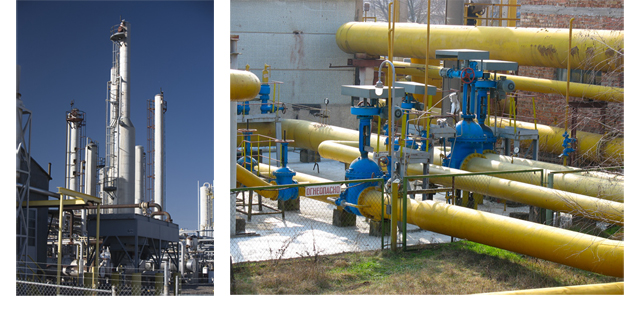 More people, more money, more machines: This seems to be how development proceeds. But the machines that save our time and improve our lives (we think) need to be powered one way or another. One way of fueling our machines and our economy is natural gas. More people, more money, more machines: This seems to be how development proceeds. But the machines that save our time and improve our lives (we think) need to be powered one way or another. One way of fueling our machines and our economy is natural gas.
Natural gas is combustible, which means it will burn. It's made of different hydrocarbon gases, mostly methane. It's usually found underground near oil deposits, but it is also made biologically, as microorganisms break down organic matter into methane and other substances. Natural gas has a lot of benefits as a fuel. It is widely available. It burns cleaner than other fossil fuels, releasing from 30% to 45% less carbon dioxide into the atmosphere than coal or oil. It doesn't create soot or sulfur dioxide when burned. It can be used to run a variety of household appliances, as well as cars, trucks, buses, and even airplanes. And because it's lighter than air, any leaking gas would likely float up into the sky and dissipate. This reduces the chances of an explosion. Of course, there are drawbacks. While natural gas is cleaner than other fuels, it still releases some carbon dioxide into the atmosphere when burned, meaning it contributes to global warming. Like its dirty cousins coal and oil, natural gas is a fossil fuel and will eventually run out. Being far below the surface, natural gas requires long pipelines to reach it and distribute it. These pipelines disrupt ecosystems. It's also not very efficient in cars and buses; the mileage from natural gas is lower than that from gasoline. In the end, natural gas is probably best as an interim step but not a solution to our fossil fuel addiction. It is cleaner than coal and oil, but it still results in pollution. It may not speed up global warming as much as those other fuels, but it still contributes. It may be greener, but it is not the green power source that will save us. 更多人、更多錢、更多機器:這似乎是發展進行的方式。但我們認為能節省時間並改善生活的機器,需要以某種方式來供給動力。為我們的機器及經濟提供燃料的方式之一就是天然氣。 天然氣是可燃氣體,表示它會燃燒。它是由不同的碳氫化合物氣體組成,其中主要是甲烷。天然氣通常能在石油礦床附近的地底被發現,但它也能以生物方式製成,因為微生物會將有機物質分解成甲烷及其他物質。 天然氣作為燃料有許多優點。它很容易取得,燃燒時比其他化石燃料更為乾淨,釋放到大氣層的二氧化碳比煤炭或其他化石燃料要少上30-45%。它燃燒時不會產生煤灰或二氧化硫。它可以被用來驅動數種家用品、汽車、卡車、公車甚至是飛機。而因為它比空氣還輕,任何外漏的氣體很可能會升到空中而揮發,減少了爆炸的機率。 天然氣當然有缺點。雖然天然氣較其他燃料乾淨,但它燃燒時仍會釋放些許二氧化碳進入大氣層,這表示它也會造成全球暖化。就跟它骯髒的親戚煤炭和汽油一樣,天然氣也是化石燃料,終有一天會用盡。天然氣在地底深處,需要很長的管線才能取得與配送,而這些管線會干擾生態系統。天然氣使用在汽車和公車上的效益不高,每單位的行駛哩數也比汽油來得低。 天然氣最終只是一個過渡時期的步驟,但卻無法解決我們長期使用化石燃料所產生的問題。它比煤炭和石油來得乾淨,但它仍會導致汙染。它或許不會像其他燃料那樣加速全球暖化,但它仍有影響。它或許較環保,但卻不是能拯救我們的綠色動力能源。 |
沒有留言:
張貼留言